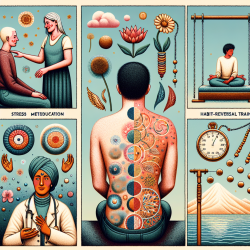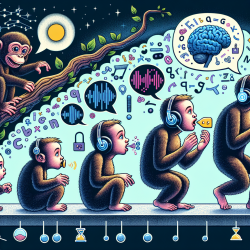Eczema, a prevalent inflammatory skin disorder, affects approximately 7.3% of the US adult population. Patients with eczema often endure a high psychological burden due to chronic pruritus, which exacerbates the itch-scratch cycle. While traditional treatments focus primarily on physiological factors, recent research highlights the potential benefits of addressing cognitive, behavioral, and social factors through psychotherapeutic interventions.
The Role of Psychotherapeutic Interventions
The research article "Alternative Psychotherapeutic Approaches to the Treatment of Eczema" by Oska and Nakamura explores various psychotherapeutic methods that complement standard medical care. These interventions have shown promise in alleviating both eczema symptoms and associated psychological distress.
Meditation and Mindfulness
Meditation and mindfulness practices have been found to significantly improve eczema symptoms. A study by Xie et al. demonstrated that an Integrative Body-Mind-Spirit program led to substantial improvements in skin conditions and reduced anxiety levels in children with eczema. Similarly, Habib et al. reported that a psychoeducational stress management program effectively reduced pruritus and social anxiety.
Stress Reduction Techniques
Stress reduction methods such as autogenic training (AT) and progressive muscle relaxation (PMR) have shown efficacy in managing eczema. Ehlers et al. found that stress reduction therapies improved skin lesion severity and reduced eczema-related distress. Bae et al.'s study further validated PMR's effectiveness in enhancing psychological parameters like depression and anxiety.
Habit-Reversal Training
Habit-reversal training (HRT) focuses on modifying the scratching behavior associated with eczema. Norén et al.'s study revealed that HRT combined with topical therapy significantly improved SCORAD scores. Anderson's case study highlighted HRT's potential to reduce self-severity eczema scores and enhance quality of life.
Hypnotherapy
Hypnotherapy offers a unique approach by guiding patients into a trance-like state where they are more receptive to positive suggestions. Studies by Stewart et al. and Hájek et al. demonstrated hypnotherapy's effectiveness in reducing itch intensity and improving overall skin condition.
Music Therapy
Music therapy, particularly the U sequence technique, has been beneficial in alleviating pruritus and enhancing patient perception of improvement. Demirtas et al.'s study showed significant reductions in pruritus intensity among patients undergoing music therapy.
Encouraging Further Research
The integration of psychotherapeutic interventions into eczema treatment plans offers promising avenues for improving patient outcomes. However, further research is needed to standardize these approaches and identify suitable candidates for each intervention. Practitioners are encouraged to explore these alternative therapies to provide holistic care for their patients.
To read the original research paper, please follow this link: Alternative Psychotherapeutic Approaches to the Treatment of Eczema.










